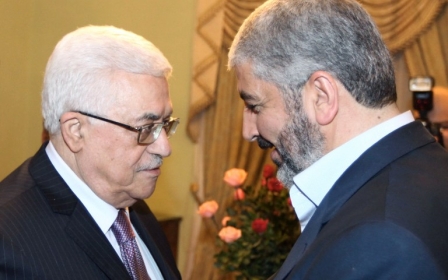Israeli official: Palestinians sabotaged peace process

Israel's chief security official last month sent Western diplomats a document that he claims proves the Palestinians never intended to follow through with peace negotiations, Israeli newspaper Haaretz reported on Wednesday.
In a letter sent on 22 April, National Security Advisor Joseph Cohen wrote that Palestinian plans to reject "American proposals and pursue unilateral actions" were in place well in advance of the talks process failing.
Sent on the same day Fatah and Hamas announced a Palestinian reconciliation deal,the letter went out to US Ambassador to Israel Dan Shapiro, all of the European Union's ambassadors and Russian and Chinese ambassadors, as well as others, the Tel Aviv-based newspaper said. Haaretz has made a copy of one of the letters public.
Cohen attached a 65-page document that chief Palestinian negotiator Saeb Erekat apparently submitted to Palestinian Authority President Mahmoud Abbas during the peace talks and three weeks before Israel was scheduled to release a group of Palestinian prisoners. In the document, Haaretz reports, Erekat recommends several strategies that Cohen says shows "damning evidence of bad faith on the part of the Palestinian side."
Cohen said that Erekat's suggestions included the PA applying to join various international conventions, declaring that Palestinians would not extend the talks beyond 29 April and escalate efforts to reconcile with Hamas.
New MEE newsletter: Jerusalem Dispatch
Sign up to get the latest insights and analysis on Israel-Palestine, alongside Turkey Unpacked and other MEE newsletters
The security official asked diplomats to pass the letter on to relevant officials and "that the neccessary conclusions be drawn both with respect to Palestinian responsibility for the current impasse and to the measures needed to respond appropriately to the situation that has been created which gravely endangers prospects for advancing the peace process."
Israeli officials halted peace talks on 24 April after the announcement that a unity deal had been struck between the Palestinian leadership and the Islamist Hamas rulers in Gaza after a seven-year split.
Lieberman denies spying
News of Cohen's letter emerges on the same day that Israel's foreign minister has been forced to deny allegations that his country was engaged in spying activities on US soil, following a report published in Newsweek.
In the article, anonymous US officials said Israel had gone too far in its attempts to secure industrial and technical intelligence from its number-one ally, and had "crossed red lines."
"No other country close to the United States continues to cross the line on espionage like the Israelis do," said a former congressional staffer who attended a classified briefing in late 2013, according to Newsweek.
But Israeli Foreign Minister Avigdor Lieberman denied the charges. "We categorically reject such an accusation," he told army radio.
"We're talking about lies and falsehood, simply libel which is baseless and unfounded," Lieberman said, describing the remarks as "malicious."
"I am sorry that there are apparently anonymous elements in the United States who are simply trying to maliciously spread false accusations," he said.
The minister said Israel had "learned its lesson" from the case of Jonathan Pollard, a US naval analyst who was arrested in Washington in 1985 and sentenced to life in jail for spying on the United States for Israel.
Lieberman said Israel was not involved in any form of espionage against the United States, direct or indirect.
He also denied allegations also made in the Newsweek story that the alleged spying was connected to Israel's so-far futile attempts to join the US visa waiver programme.
Born into a Jewish family from Texas, Pollard passed to Israel thousands of secret documents about US spy activities in the Arab world over a period of 18 months. He won Israeli citizenship in 1995 and was officially recognised as an Israeli spy three years later.
His arrest sparked a crisis in ties that only ended with Israel promising to end all espionage activities on US soil.
Middle East Eye delivers independent and unrivalled coverage and analysis of the Middle East, North Africa and beyond. To learn more about republishing this content and the associated fees, please fill out this form. More about MEE can be found here.




